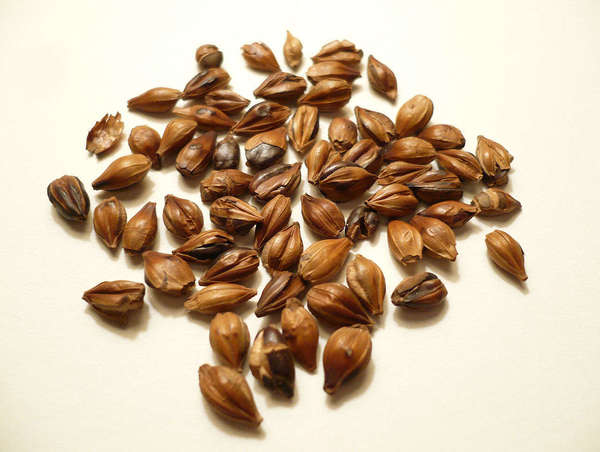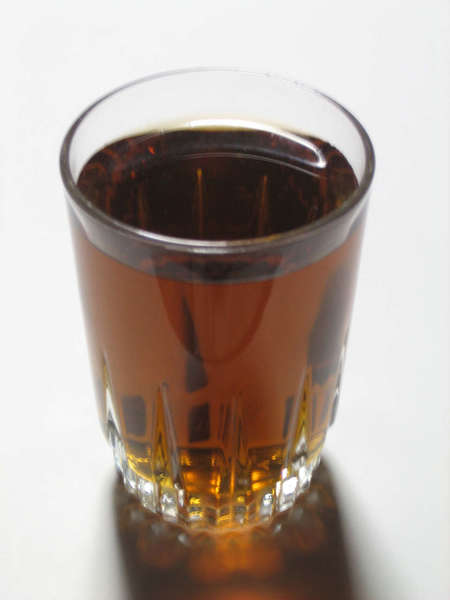Barley Tea
Wikipedia: Roasted_barley_teaLast Updated: Feb. 3, 2014
↑About Barley Tea
Barley tea, is an herbal tea made out of whole barley kernels. Usually it is made of roasted barely, and it is sometimes called roasted barely tea. Roasted barley tea is popular in Japan, where it is called mugicha (麦茶), and in Korea, where it is called boricha (보리차).The word "tisane", now a general word for herbal tea, originated from the French word ptisana for barley water.[1]
Barley tea can be drunk both hot and iced. In Japan, it is a popular summer drink, commonly served iced. The Korean variant is often served hot. Japanese brands are widely available in tea bags designed for cold-brewing.
The blog Just Hungry offers a few tips on preparation on their post Mugicha (barley tea) is the flavor of summer in Japan.
Italian and Latino barley beverages
A barley-based beverage, called Caffè d'orzo, is also popular in Italy; that drink is different in style and preparation from the Japanese and Korean barley teas, more similar to how hot chocolate or espresso is prepared than to most tea. This drink is often called barley coffee. Rather than being steeped for flavor and then removed, the barley is added directly to hot water to make a thicker drink; milk is usually added. Orzo is Italian for barley, not to be confused with the pasta of the same name, which is named because it resembles cooked barley kernels.In addition to this beverage, Italian varieties of barley are sometimes used to make barley teas that are prepared more like traditional Japanese and Korean types, by steeping the barley in hot water like conventional teas.
To complicate things further, people in Latin American countries drink beverages called café de cebada, which is literally translated "coffee of barley", which are prepared more like the barley teas of Japan and Korea.
Making your own barley tea
Mugicha or boricha can be made at home from whole barley kernels, by toasting them in a pan and then steeping the roasted kernels in or storing them for later steeping. Whole barley kernels are available at most supermarkets and bulk food stores. The blog La Fuji Mama offers instructions on Making your own mugicha by roasting your own barley. Commercial preparations often involve crushing the barley; crushing has been shown to increase the intensity of the flavor and aroma.[2]Storage
Because it is made of whole grain kernels, barley tea does not stay fresh as long as most dried herbal teas once it has been opened. It can be frozen for short periods of time but is generally best to buy only in as small a packet as you can use up quickly.Health properties
Barley tea contains more calories than is typical for an herbal tea, but the amount is still small relative to most caloric drinks like milk or juice. Barley tea has been shown to contain a number of compounds with potent antioxidant activity.[3] Barley contains gluten, so it needs to be avoided by people sensitive to gluten.Some preliminary work has shown that barley coffee helps to prevent bacteria from adhering to surfaces, which suggests that it may be useful for promoting oral health and preventing tooth decay.[4] It also has been shown to promote blood fluidity.[5]
References:
1. Tisane - Collins English Dictionary, Complete & Unabridged 10th Edition, 2009. Retrieved from Dictionary.com, Feb. 3, 2014.
2. S.K. Yoon, W.J. Kim, Effects of roasting conditions on quality and yields of barley tea, Korean Journal of Food Science and Technology, Aug, 1989.
3. Hideo Etoh et. al., Anti-Oxidative Compounds in Barley Tea, Bioscience, Biotechnology, and Biochemistry, Vol. 68, No. 12, pp. 2616-2618, 2004.
4. M. Stauder et. al., Inhibitory Activity by Barley Coffee Components Towards Streptococcus Mutans Biofilm, Current Microbiology, Vol. 61, No. 5, pp 417-421, Nov. 2010.
5. H. Suganuma et. al., Amelioratory effect of barley tea drinking on blood fluidity, J Nutr Sci Vitaminol (Tokyo), Vol. 48, No. 2, pp. 165-8, Apr, 2002.



